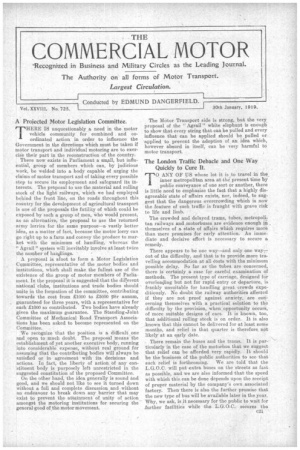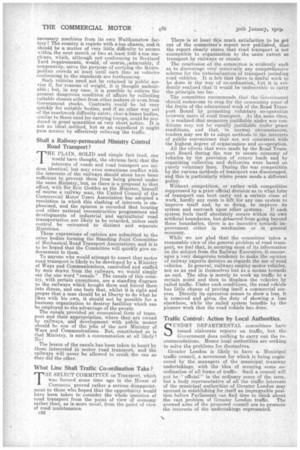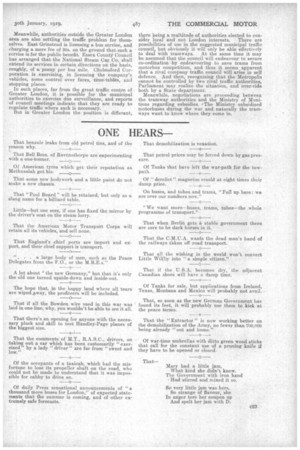A Projected Motor Legislation Committee.
Page 1

Page 2

Page 3

If you've noticed an error in this article please click here to report it so we can fix it.
THERE IS unquestionably a need in the motor vehicle community for combined , and coordinated action in order to influence the Government in the directions which must be taken if motor transport and individual motoring are to exercise their part in the reconstruction of the country.
There now exists in Parliament a small, but influential, group of members which can, by judicious work, be welded into a body capable of urging the claims of motor transport and of taking every possible step to secure its employment and safeguard its interests. The propose to use the material and rolling stock of the light railways, which we had employed behind the front line, on the roads throughout this country for the development of agricultural transport is one of the proposals the futility of which could be exposed by such a group of men, Who would present, as an alternative, the proposal to use the returned army lorries for the same purpose—a vastly better idea, as a matter of fact, because the motor lorry can go right up to a farm and convey the produce to market with the minimum of handling, whereas the " Agrail " system will inevitably involve at least twice the number of hanillings. • A proposal is afoot to form a Motor Legislation Committee, representative of the motor bodies and institutions, which shall make the fullest use of the existence of the group of motor members of Parliament. In the proposal it is suggested that the different national clubs, institutions and trade bodies should unite in the formation of the committee, contributing towards the cost from 21000 to 25000 -Or annum, guaranteed for three years, with a representative for each 21000 so contributed. Two bodies have already given the maximum guarantee. The StandingJoint Committee of Mechanical Road Transport Associations has been asked to become represented on the Committee.
We recognize that the position is a difficult one and open to much doubt. The proposal means the establishment of yet another executive body, running into considerable expense, without real ground for assuming that the contributing bodies will always be satisfied or in agreement with its decisions and actions. In fact, the liberty of action of any constituent body is purposely left unrestricted in the suggested constitution of the proposed Committee.
On the other hand, the idea generally is sound and good, and we should not like to ace it turned down without a full and complete discussion and without an endeavour to break down any barrier that may exist to prevent the attainment of unity of action amongst the motoring institutions for securing the general good of the motor movement. The Motor Transport side is strong, but the very proposal of the ' Agrail" white elephant is enough to show that every string that can be pulled and every influence that can be applied should be pulled or applied to prevent the adoption of an idea which, however absurd in itself, can be very harmful to motor transport.
Quickly to Cure It. .
TO ANY OF US whose lot it is to travel in the inner metropolitan area at the' present time by public conveyance of one sort or another, there is little need to emphasize the fact that a highly disagreeable state of affairs exists, nor, indeed, to suggest that the dangerous overcrowding which is now the feature of such traffic is fraught with grave risk to life and limb.
he crowded and delayed trams, tubes, metropolitan railways and motorbuses are evidence enough in, themselves of a state of affairs which requires more than mere promises for early attention. An immediate and decisive effort is necessary to secure a remedy.
There appears to be one way—and only one way— Out of the difficulty, and that is to provide more trityelling accommodation at all Costs with the minimum possible delay. So far as the -tubes are concerned, there is certainly. a case for careful examination of methods. The present type of carriage, designed for overloading but not for rapid entry or departure, is frankly unsuitable for handling great crowds expeditiously. No doubt the railway authorities affected if they are not proof against anxiety, are concerning themselves with a practical solution to the difficulty by the provision, when opportunity occurs, of more suitable designs of cars. It is known, too, that additional rolling stock is on order. It is also .known that this cannot be delivered for at least some months, and relief in that quarter is therefore not likely at an early date.
• There remain tho buses and the trams. It is particularly in the case of the motorbus that we suggest that relief can be afforded very rapidly. It should be the business of the public authorities to see that such relief is forthcoming. We are told that the L.G.O.C. will put extra buses on the streets as fast as possible, and we are also informed that the speed with which this can be done depends upon the receipt of proper material by the company's own associated factory. Then there is also the further promise that the new type of bus will be available later in the year. Why, we ask, is it necessary for the public to wait for ,further facilities while the L.G.O.C. secures the necessary machines from its own Walthamstow -factory'? The country is replete with 4-ton chassis, and it should be a matter of very little difficulty to secure within the next month or two at least 1000 4-ton machines, which, although not conforming to .Scotland Yard requirements, would, of course, admirably, if temporarily, serve the purpose of carrying the Metropolitan crowds at least until such time as vehicles conforming to the standards are forthcoming. Such vehicles need not be retained in public service if, for reasons of weight, it is thought undesirable; but, in any case, it is possible to relieve the present dangerous condition of affairs by collecting suitable chassis either from other makers or even from Government stocks. Contracts could be let very quickly for suitable bodies, and if no other way out of the coachwork difficulty exists, char-asbancs bodies, similar to those used for carrying troops, could beproduced in great quantities at very short notice. It is not an ideal method, but as .an expedient it might pass muster by effectively relieving the traffic.
Shall a Railway-permeated Ministry Control Road Transport ?
THE PLAIN, SOLID and simple fact (and, one . would have thought, the obvious fact) that the interests of roads and road transport are seldom, identical, but may even sometimes conflict with the interests of the railways should alone have been sufficient to prevent them from being placed under the same Ministry, but, as there iS a proposal to that effect, with Sir Eric Geddes as the Minister, himself of course a railway man,the United Council of the Commercial Motor Users Association has adopted a resolution in which this clashing of interests is emphasized, and the opinion is recorded that housing and other national reconstruction programmes and developments of industrial and agricultural road transportation are likely to be retarded, unless such control be entrusted to distinct and separate Ministries.
These expressions of opinion are submitted to the other bodies forming the Standing Joint Committee of Mechanical Road Transport Associations, and it is to be hoped that the Committee will quickly give endorsement to them.
To anyone who would attempt to assert that motor road transport is likely to be developed by a Ministry of Ways and Communications, controlled and staffed by men drawn from the railways, we would simply say the one word "canals." The canals of this country, with certain exceptions, are a standing disgrace to the railways which bought them and forced them into disuse, and one feels that, whilst it is right and proper that a man should be at liberty to do what he likes with his own, it should not be possible for a business organization to destroy facilities which can be employed to the advantage of the people. The canals provided an economical form of transport. and their appropriation, where they are owned by railways, and development • with public money should be one of the jobs of the new Ministry of Ways and Communications. But, constitutedas is that Ministry, is such a consummation at all likely? No !
The lesson of the canals has been taken to heart by those interested in motor toad transport, and the railways will never be allowed to crush the one as they did the other.
What Line Shall Traffic Coordination Take ?
TUE SELECT COMMITTEE on Transport., which was formed some time ago in the House of Commons. proved rather a serious disappointment to those who hoped that the opportunity would have been taken to consider the whole question of road transport from the point of view of economy rather than as is more usual, from the point of view of road maintenance.
e22
There -is at least this much satisfaction to be got out of the committee's report now published, that the report clearly states that road transport is not susceptible to organization to the same extent as transport by railways or canals.
The conclusion of the committee is evidently such as to discourage very materially any comprehensive scheme for the nationalization of transport including road vehicles. It is felt that there is Useful work to be done in the way of co-ordination, hut it is evidently realized that. 'it would be undesirable to carry the principle too far The committee recommends that the Government should endeavour to reap for the community some of the fruits of the educational work of the Road Transport Board by promoting voluntary co-operation between users of road transport. At the same time, it is realized that measures justifiable under war conditions may not be equally justifiab4e under peace conditions, and that, in normal circumstances, traders may see fit to adopt methods in the interests of public convenience that are not consistent with the highest degree of organization and co-operation. All the efforts that were made by the Road Transport Board during the war to secure eeonomy of vehicles by the provision of return loads and by organizing collection and deliveries were based on purely voluntary lines. During the war competition by the various methods of transport was discouraged, and this is particularly where peace needs a different policy. Without competition, or rather with competition suppressed by a prior official decision as to what form of transport can best carry out a, certain class of work, hardly any room is left for any one system to improve itself and, by so doing, to improve its system and encroach upon other systems. If each system feels itself absolutely secure within its own artificial boundaries, but debarred from going beyond those boundafies, there is no incentive towards improvement either in mechanism or in general economy.
While we are glad that the committee takes a reasonable view of the general problem of road transport, we feel that, in securing most of its information on the subject from the Railway Executive, it encourages a very dangerous tendency to make the opinion of railway experts decisive as regards the use of road vehicles. In general, railways employ motor vehicles, not as an end in themselves but as a means towards an end. The idea is merely to work up traffic to a certain point and then to displace the vehicles by railed trafficUnder such conditions, the road vehicle has little chance of proving itself a commercial success. Directly its operation ceases to show a loss, it is removed and given the duty of showing a loss elsewhere, while the railed system benefits by the pioneer work that the road vehicle has done.
Traffic Control: Action by Local Authorities.
SUNDRY DEPARTMENTAL committees have issued elaborate reports on traffic, but the Government does nothing to carry out the recommendations. Hence local authorities are seeking to solve the problems for themselves.
Greater London is likely to have aMunicipal traffic council, a movement for which is being engineered by the managers of the m-unicipal tramway undertakings, with the idea of securing some coordination of all forms of traffic. Such a council will not be "official" in the ordinary sense of the term, but a body representative of all the traffic interests of the municipal authorities of Greater London may succeed in establishing for itself an impregnable position before Parliament can find time to think about the vast problem of Greater London traffic. The avowed aims of the proposed council are to promote the interests of the undertakings represented. Meanwhile, authorities outside the Greater London area are also settling the trate problem for themselves. East Grinstead is licensing a bus service, and charging a mere fee of 20s. on the ground thatsuch a service is for the public benefit. Essex County Council has arranged that the National Steam Car Co. shall extend its services in certain directions on the basis, roughly, of a penny per bus mile. Chelmsford Corporation is exercising, in licensing the company's vehicles, some control over fares, time-tables, and stopping places.
In such places, far from the great traffic centre of Greater London, it is possible for the municipal authorities to exercise due surveillance, and reports of council meetings indicate that they are ready to regulate traffic where such is necessary. But in Greater London the position is different, there being a multitude of authorities elected to consider local and not London interests. There are possibilities of use in the suggested municipal traffic council, but obviously it will only be able effectively to deal with tramways. At the same time it may be assumed that the council will endeavour to secure co-ordination by endeavouring to save trains from motorbus competition, and thus it seems apparent that a rival company traffic council will arise in sell defence. And then, recognizing that the Metropolis cannot be controlled by two rival traffic authorities! Parliament may realize the situation, and over-ride both by a State department. Meanwhile, negotiations are proceeding between the tramway authorities and the Ministry of Mimitions regarding subsidies. 'The Ministry subsidized motorbuses during the war and naturally the tramways want to know where they come in.






















